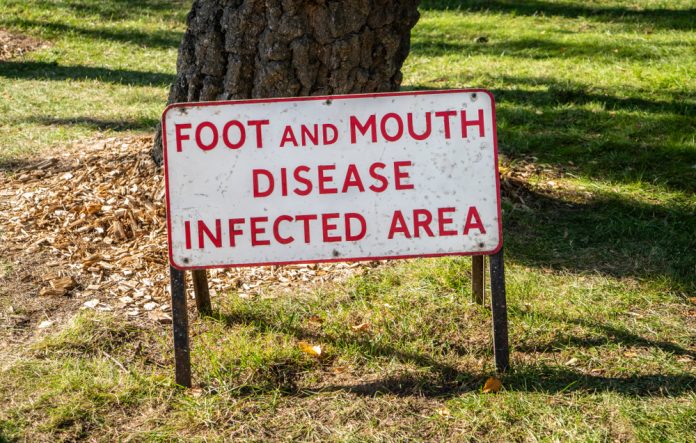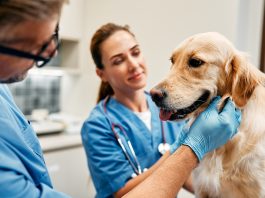The UK government has ramped up biosecurity measures following the confirmation of a Foot and Mouth Disease (FMD) outbreak in Germany, marking the first occurrence of the disease there in over 35 years.
While the UK remains free of the virus, officials are urging vigilance to safeguard livestock and prevent Foot and Mouth Disease from reaching British shores.
UK Farming Minister Daniel Zeichner commented: “The Government will do whatever it takes to protect our nation’s farmers from the risk posed by Foot and Mouth.
“That is why restrictions have immediately been brought in on animal products from Germany to prevent an outbreak, and we will not hesitate to add additional countries to the list if the disease spreads.
“We will continue to keep the situation under review, working closely with the German authorities.”
What is Foot and Mouth Disease?
Foot and Mouth Disease is a highly contagious viral infection affecting cloven-hoofed animals such as cattle, sheep, pigs, and goats.
The disease spreads rapidly through direct contact with infected animals, contaminated feed, equipment, or even through the air over short distances.
Clinical signs vary by species but typically include:
- Cattle: Sores, blisters on the mouth, feet, and tongue, fever, lameness, and reluctance to feed.
- Sheep and pigs: Often present with lameness and occasional blistering.
While FMD does not pose a risk to human health or food safety, it has severe economic consequences for affected regions due to production losses, trade restrictions, and the cost of containment efforts.
Germany’s response to the outbreak
The outbreak in Germany was first reported at a buffalo farm in Hönow, Brandenburg, and later detected at a nearby farm in Schöneiche.
As a precaution, authorities culled 55 goats and sheep alongside three cattle. The affected farm had recently purchased hay from the buffalo farm, highlighting the virus’s ability to spread through contaminated materials.
A 72-hour transportation ban on susceptible animals was immediately imposed to contain the disease. Investigations indicate that the outbreak remains limited to the two farms.
Commenting on the outbreak, the World Organisation for Animal Health (WOAH) said: “WOAH acknowledges Germany’s rapid official notification of an outbreak of Foot and Mouth Disease) marking the disease’s first occurrence in the country since 1988.
“While the FMD virus is not considered a public health problem, it’s crucial for animal health due to its easy transmission and the significant economic impact it can have.
“Germany has already been putting containment measures in place. Early detection and rapid response are critical to contain any outbreak.
“WOAH is fully committed to supporting its Members to prevent and rapidly respond to the risk associated with FMD along with its partners and network of reference laboratories.”
Impact on trade and UK biosecurity
Germany, a significant exporter of pork and dairy products to the UK, now faces restrictions as the UK bans imports of live animals, meat, and dairy products from the country.
Effective from 15 January, all travellers are prohibited from bringing unpackaged meat, dairy, and other animal-derived products from Germany into Great Britain, even if commercially packaged. Secure disposal bins have been installed at ports and airports to enforce this policy.
The UK Chief Veterinary Officer has urged farmers and livestock keepers to enhance biosecurity measures and watch for FMD symptoms.
Livestock keepers are reminded of the importance of disinfecting equipment, controlling animal movements, and avoiding contact with potentially contaminated materials.
In addition, the UK government has announced a £200m investment in its Weybridge laboratory facilities, a key centre for animal disease research and diagnostics.
This funding aims to bolster the nation’s preparedness against outbreaks like FMD and other zoonotic diseases.
Strategies to combat Foot and Mouth Disease
Vaccination remains a cornerstone in combating FMD. Vaccines can protect animals from infection and limit the spread of the virus during an outbreak. However, challenges exist:
- Vaccine storage: FMD vaccines require cold storage, complicating distribution in regions with limited infrastructure.
- Strain-specific protection: The virus has multiple serotypes, and vaccines must match the specific strain circulating in an outbreak for maximum effectiveness.
- Trade implications: Many countries restrict trade from regions using FMD vaccines due to difficulties distinguishing vaccinated animals from infected ones.
Despite these hurdles, modern advancements, including marker vaccines that differentiate between infected and vaccinated animals, are improving global response capabilities.
Preventing the next outbreak
This Foot and Mouth Disease outbreak underscores the critical importance of vigilance and investment in biosecurity and research.
While Germany works to contain its outbreak, the UK is taking proactive steps to protect its livestock industry.
By maintaining rigorous measures and advancing vaccination strategies, the agricultural sector can better protect animals, farmers, and global trade from the far-reaching effects of this highly contagious disease.





